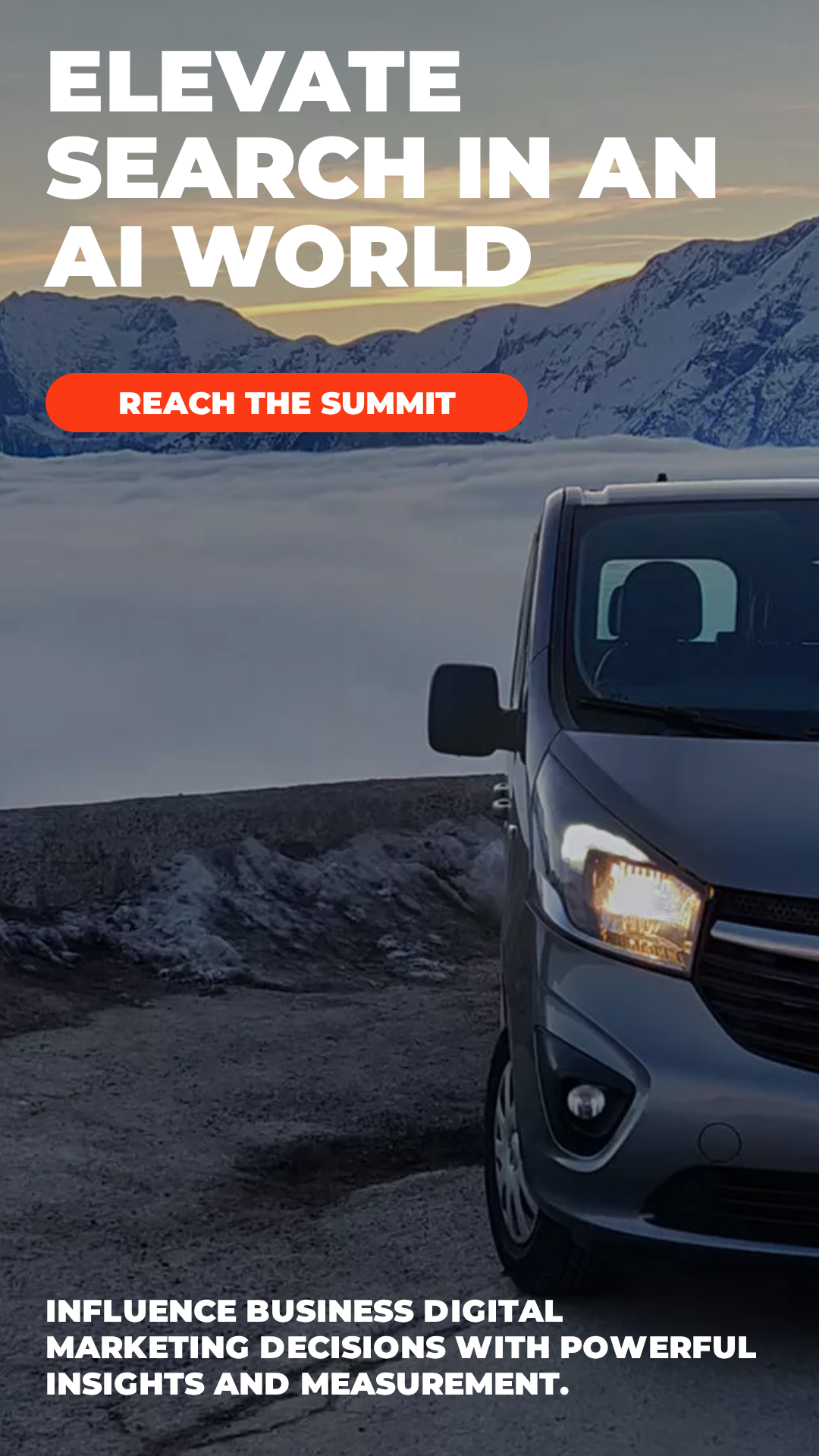We’ve said it before, and we’ll say it again – the search landscape is changing, and fast.
Remember the days when you typed a few keywords into a search bar, then combed through pages of results, hoping to strike gold? Now, we’re asking direct questions to AI tools and chatbots, expecting lightning-fast, perfectly packaged answers, often without even glancing at the search results page.
So, is it time to swap SEO for AEO (Answer Engine Optimization)?
Find out what makes AEO different from SEO, why it matters for B2B businesses and how to adapt your strategy to reap the benefits.
What you’ll find:
- SEO vs AEO – what’s the difference?
- What is AEO?
- The benefits of AEO
- Will AEO replace SEO?
- How to optimise for AEO – 7 tips
SEO vs AEO – what’s the difference?
Traditional Search Engine Optimization (SEO) is all about visibility – optimizing your content so it ranks higher in search engine results pages (SERPs) through hundreds of elements such as keywords, links and technical SEO.
AEO, on the other hand, focuses on queries and answers. It’s about understanding user intent and serving up quick, concise and accurate information.
What is AEO?
AEO stands for Answer Engine Optimization. An answer engine uses machine learning, natural language processing (NLP) and generative AI to understand user intent and generate an answer.
Think of the likes of Alexa, Siri or ChatGPT – AI answer engines designed to give you what you want without clicking through links. This is the rise of the ‘zero-click’ search, where users get what they need directly from the search page or AI-generated response.
AEO is a relatively new concept that focuses on optimising content to answer user queries directly. While keywords still matter, the game has shifted. It’s about crafting relevant content that’s so to-the-point, it earns a coveted spot in AI overviews, rich snippets or answer boxes.

What are the benefits of AEO for B2B Businesses?
Increasingly, people are turning to AI tools, voice search and featured snippets to find the answers to their questions quickly and conveniently. For B2B businesses, AEO could be a game-changer.
Take Google’s AI overviews for example, which have been cropping up for around 0.55% of searches and are rapidly growing. Currently, around 32% of B2B queries generate an AI overview (BrightEdge).
Done right, Answer Engine Optimization can lead to:
- Higher authority in your space as a trusted source of information
- Increased traffic and engagement from the people who matter
- A better user experience
- A future-proof strategy that keeps you relevant as AI continues its takeover
Industries like healthcare, education and travel are primed for AEO, where users are asking specific, direct questions like “What are the symptoms of arthritis in my knee?” or “How long does it take to get to the French Alps?”
According to a survey by Neil Patel, 31.5% of businesses already have a plan in place to optimise their web pages for Chatbots. So, if you’re not thinking about AEO, you might be missing out on high-intent traffic.
Is AEO replacing SEO?
Does the ‘zero-click’ revolution mean we can leave SEO in the dust? The short answer is no, AEO isn’t pushing SEO out the door.
According to Forbes, the global SEO market is expected to reach 122.11 billion USD in 2028 so there’s plenty of life left in it. SEO is still a vital part of a businesses’ marketing plan, as reach, visibility and site traffic is always important.
The rise of “zero-click” searches means fewer users are clicking through to websites, which could see organic traffic dip by as much as 25% (Gartner). So, while AEO is bringing in new ways to reach audiences, SEO is still crucial for keeping your site visible and competitive.
While Search GPT may not be the death of Google search, the move towards direct, conversational responses means that AEO is a necessary evolution in how we optimize content. Think of it as an extra layer on top of your SEO strategy, not a replacement.
AEO and SEO go hand in hand. The core strategies overlap, but Answer Engine Optimization is all about positioning yourself as the go-to answer in an AI-driven world. It’s not a question of SEO or AEO – it’s about balancing both to ensure you’re ahead of the curve.

How to optimize for AEO: 7 tips
Optimizing for answers isn’t a trend – it’s the future. And the sooner you get on board, the better. Get started with these tips:
1. Keep up with the algorithms
Search engines like Google are constantly evolving their algorithms, and it pays to keep up. To stay in the game, keep testing and tweaking your strategy. What gets you into a featured snippet now might not cut it next month, so stay agile and on top of best practices.
2. Don’t leave out Bing
While Google tends to steal the spotlight, don’t sleep on Bing. Especially as SearchGPT and other platforms start gaining traction, your multi-channel marketing needs to cast a wider net. The more places your business shows up with clear, authoritative answers, the better positioned you’ll be. Diversify or miss out!
According to Neil Patel, the top factors that lead ChatGPT to mention a brand in an answer include; brand mentions, quality reviews and ratings, relevant keywords, age and authority. So, make sure your brand is top-of-mind (and top-of-search).
3. Create content with topical authority
In the era of AI, content is still king – but only if it’s written by experts and rich in value. Becoming a thought leader shows answer engines that your content is credible and worth featuring.
We’ve already stressed the importance of topical authority in the age of AI search but it’s worth mentioning again that in-depth coverage of a topic, backed up by experts in your field, strengthens both your SEO and AEO strategy. If you can offer a unique angle, even better – it’s your ticket to beating the competition.
To increase your chances of landing in snippets or overviews, keep your answers short, skimmable and to the point. And remember, always lead with the valuable information first for a better chance of appearing.
4. Implement structured data
Did you know that featured snippets get 8.6% of clicks, on average, when they appear in the #1 spot (Ahrefs)?
Implementing structured data for FAQs, How-tos, and Q&As can get you front and centre in those coveted snippets, People Also Ask sections, and even Knowledge Panels. Plus, adding a well-crafted FAQ section on key pages gives you a better shot at appearing in featured snippets.
5. Prioritise User Experience
Ensuring your site is optimised for Core Web Vitals, mobile responsiveness and easy navigation will still be crucial, regardless of how people find you.
The basics still need to be covered. Keeping your Google Business Profile (formerly Google My Business) and other relevant directories (yes, Bing and Apple Maps count too!) updated is essential. AI tools often pull from these sources when giving business recommendations.
6. Understand user intent
Knowing your target audience is key, but understanding why they’re searching specific keywords is what sets AEO pros apart. Is the search query Informational, Navigational, Commercial, Transactional or a mix of several? Tailoring your answers to match the intent behind the search is crucial. Nail this, and you’ll give users exactly what they’re after – and land in those top answer boxes.
Keyword research still applies here, as it will help you understand the most common searches in your niche and the specific questions people are asking. Find the relevant “what,” “who,” and “how” questions and build your content strategy around them.
7. Optimise for voice search
People talk to their devices using full, conversational questions. To keep up, you need to optimize for long-tail question keywords – even if they have lower search volume. Providing tailored, concise answers is your golden ticket to voice search success. Tools, forums, sales data – they’re all sources to find out what your audience is asking.
The Bottom Line?
If you want to stay relevant in the age of AI-driven search, it’s time to start optimizing for answers. By combining SEO and Answer Engine Optimization strategies, you’ll not only improve your visibility but also become a trusted source in your field.
Keeping up with the latest in Search takes some dedication to the cause and you have to keep your eye on the ball. For expert advice and support, explore our SEO services in London and beyond.
Author information
With 15 years of hands-on SEO and digital marketing experience, agency director Ash is the driving element behind our digital team. Ashley heads our digital execution team, delivering innovative strategic and tactical marketing initiatives and campaigns; helping propel our clients’ growth and success.
Emily, our content manager joined SeventhElement in 2018 and is behind the creative thinking and SEO content strategy that fuels our client projects.
References

















